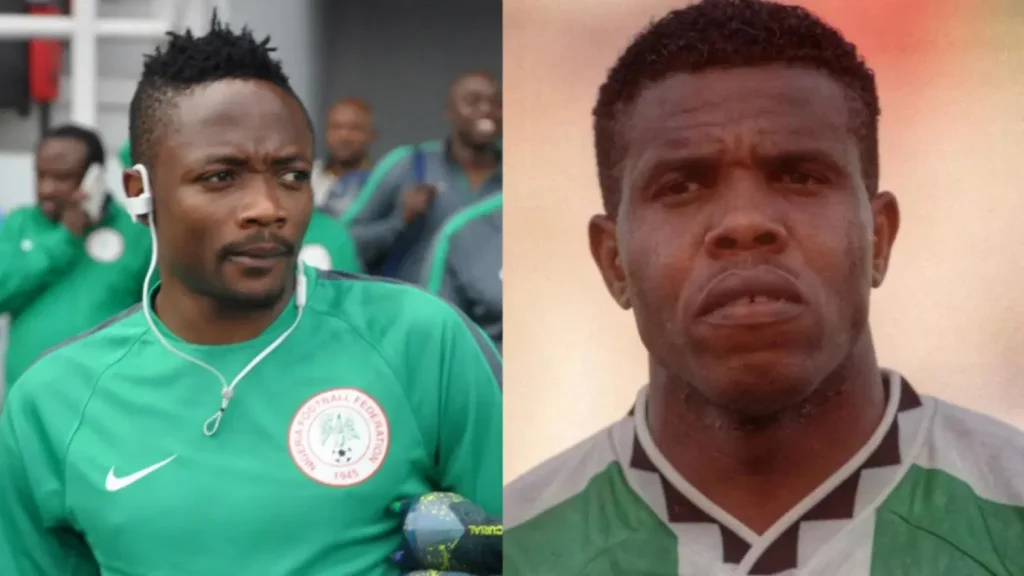On February 17, 2022, Kingsley Obiekwu, a former Nigerian international and member of the 1996 Atlanta Olympics gold medal-winning Dream Team, expressed gratitude to Super Eagles captain Ahmed Musa for a N2 million donation to alleviate his financial struggles. Obiekwu’s story, which highlighted his transition to a commercial transport business to supplement his coaching income, resonated widely, prompting Musa’s swift and generous response.
A Gesture of Compassion
Obiekwu’s economic challenges came to public attention after a viral post by broadcast journalist Okwuluora on February 14, 2022, described seeing the former defender, nicknamed “Shagari Udoji,” driving a Toyota Sienna as a taxi at Abakpa Motor Park in Enugu. The post sparked widespread concern, leading to Musa’s intervention. Obiekwu recounted, “The Media Officer of the Super Eagles called me to say someone wanted to speak with me. Musa called, heard my story, and within an hour, I got an alert of N2 million.” He expressed deep appreciation, stating, “I thank Ahmed Musa and all Nigerians home and abroad who have supported me.”
Musa, known for his philanthropy, including a N600,000 donation to a mosque in Garoua during AFCON 2021 and N20,000 each to 5,000 small business owners in Jos, did not publicly announce the gesture but was praised across social media. Sports journalist Temisan Okomi tweeted, “Ahmed Musa, in my opinion, is THE best Nigerian footballer ever. Always ready with open arms & pockets.”
Obiekwu’s Struggles and Resilience
Forced to retire at 30 in 2004 due to health issues, including an enlarged heart that limited his career after playing for clubs like Go Ahead Eagles (Netherlands), Al Ahly (UAE), and Enugu Rangers, Obiekwu faced financial difficulties upon returning to Nigeria in 2008. As a coach for INGAS FC in Enugu, he earned just N50,000 ($120) monthly, insufficient to support his family, including four children in university. “I get family, my last pikin dey primary school, di pay no dey enough,” he told BBC Pidgin.
Obiekwu turned to commercial transport, driving passengers to Nsukka, despite initial discouragement from his wife, who felt it was beneath his status as an Olympic hero. “My wife said it would be debasing for a man of my class in fame and fortune,” he shared, but necessity drove his decision. He addressed family embarrassment over the public story, saying, “I told them not to worry because I played the game and I know what I feel.”
A Call for Action
Obiekwu used his platform to advocate for retired athletes, urging them to speak out about their struggles rather than suffer in silence. “If you don’t tell Nigerians your story, they won’t know how to help you,” he said, encouraging colleagues to “do what they can to keep body and soul together.” He also advised active athletes to save and invest, warning, “Football is something you do for a period in life. If you retire and don’t save enough, you begin to struggle.”
He highlighted systemic issues, noting unpaid salaries by clubs as a factor in players’ and coaches’ hardships. “I have players in my former clubs whose marriages have crashed because they can’t provide,” he said, calling on club managers and state governments to ensure timely payments to support football development.
Critical Perspective
Ahmed Musa’s donation, while commendable, underscores a broader issue: the lack of institutional support for retired Nigerian athletes. Obiekwu’s story reflects a pattern of neglect, as seen in unfulfilled government promises of land to the 1996 Olympic team and inadequate welfare systems for ex-internationals. Social media reactions praised Musa’s humanity but criticized the system, with one user noting, “If we can’t help ourselves, we shouldn’t expect much from abroad.”
The reliance on individual philanthropy, while heartwarming, is unsustainable. Obiekwu’s case, amplified by Okwuluora’s post, highlights the power of social media in raising awareness but also the need for structural reforms, such as pension schemes or endowment funds for retired athletes. The contrast between Musa’s generosity and the absence of support from teammates like Kanu Nwankwo, as noted by some online, raises questions about collective responsibility within Nigeria’s football community.
Looking Forward
Obiekwu’s story and Musa’s response have sparked a national conversation about supporting Nigeria’s sporting heroes. With Musa’s donation providing immediate relief, Obiekwu remains optimistic, noting, “I did not waste my money, at least I have a house.” His call for athletes to share their struggles and for systemic change resonates as Nigeria prepares for events like the 2022 World Cup qualifiers, where unity and support could inspire greater achievements.






